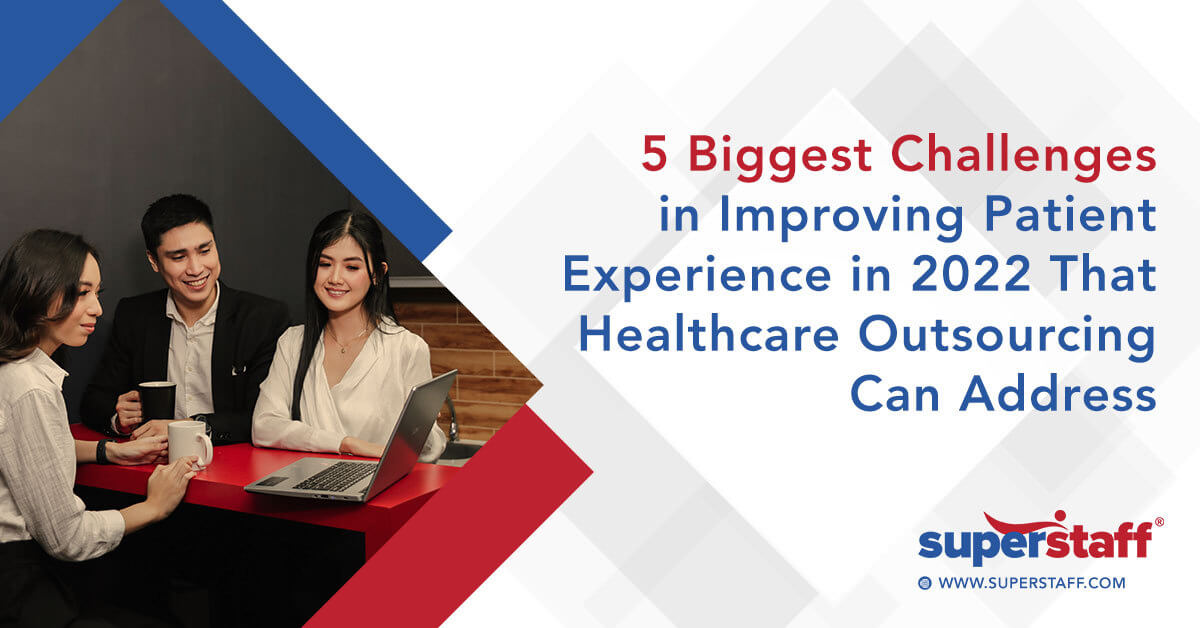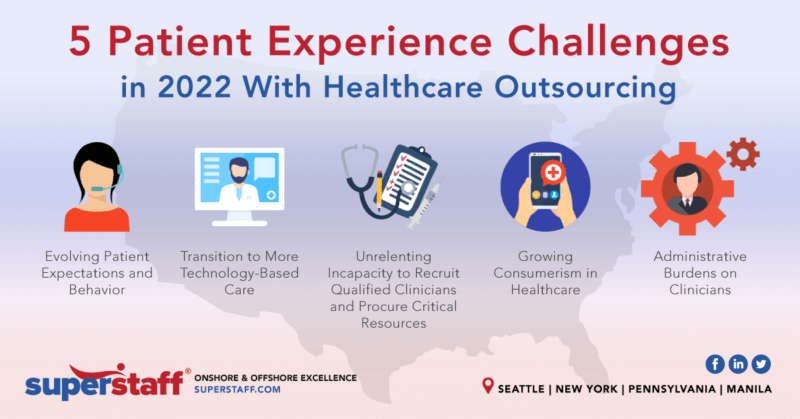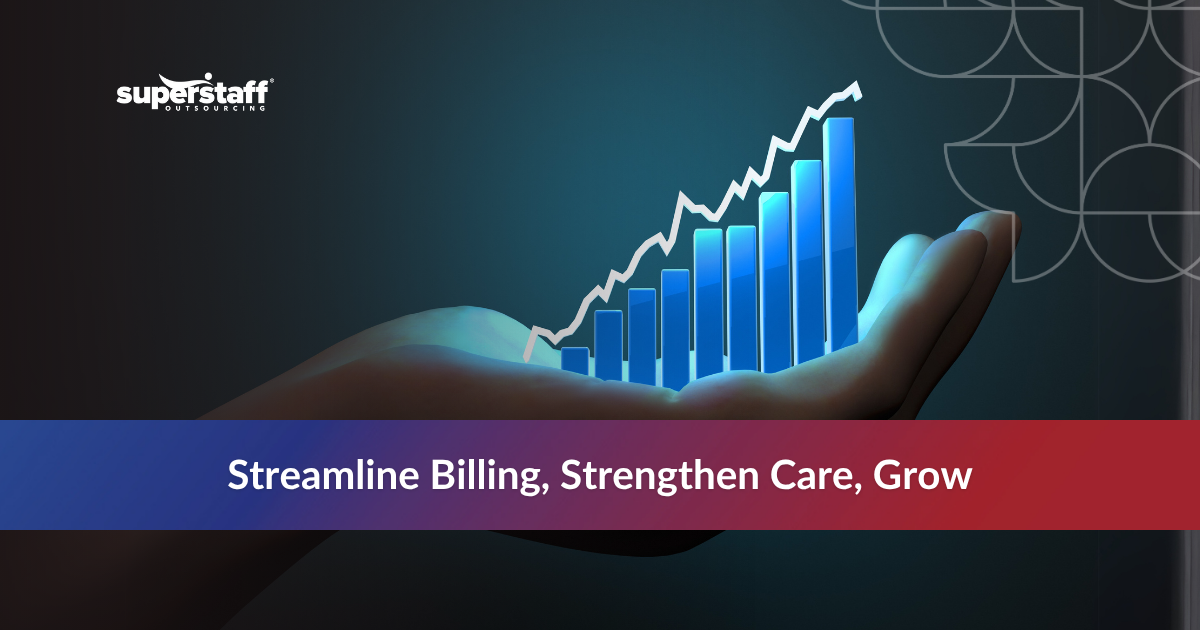
Patient experience has always been influential in shaping the hospital industry. For one thing, it defines a hospital’s financial future. As a matter of course, understanding patient experience is crucial in sustaining long-term growth.
This article will analyze the challenges healthcare providers encounter in delivering an excellent patient experience as the sector emerges into the new normal. We will also discuss one viable option embraced by many decision-makers within the hospital industry: healthcare outsourcing.
Understanding Patient Experience
Patient experience is the culmination of the patient’s interaction with their healthcare provider. It is their basis for forming perception toward the healthcare organization. From setting the online appointment to receiving post-operative care, every interaction affects how patients view their overall experience.
Patient experience significantly shapes the financial health of hospitals and other healthcare organizations. One study reported that hospitals that scored excellent in providing a positive patient experience had 2.9% higher profit margins than those that scored low.
The movement toward a patient-centered ecosystem also democratizes the industry, increasing competition from urgent care providers. The growing popularity of this form of healthcare delivery attracted more independent players to venture into the business. Measured by revenue, the market size of the urgent care centers industry reached $38.5 billion in 2021.
Address These 5 Patient Experience Challenges in 2022 With Healthcare Outsourcing
#1. Evolving Patient Expectations and Behavior
Even as technology plays an essential role in elevating patient experience, healthcare clients still expect providers to reinforce what no technology, no matter how sophisticated, can replicate: the human touch. Many professionals in the healthcare field need to work in this area. According to a survey, 25% of patients don’t strongly feel that their healthcare providers care about them as an individual.
What Do Patients Want?
Patients want healthcare providers who:
- Take time to listen, empathize, and show they understand and care for their patients
- At every point of interaction with a healthcare organization, provide a personalized experience
- Don’t treat them like another medical transaction
Healthcare outsourcing providers can offer healthcare workers valuable support in this area. By taking repetitive, time-consuming functions off the shoulders of healthcare workers, healthcare BPOs afford clinicians more time and energy to establish rapport and build connections with the patients.
#2. Transition to More Technology-Based Care
Telehealth and remote patient monitoring saw a boom during the pandemic. Data gathered during the early part of the outbreak showed that patients liked telehealth, with 83% planning to use it again even post-pandemic.
While telehealth and other tech-based care solutions benefit both patients and providers, they come with their own set of challenges. One crucial downside is cost.
The Relationship Between Technology and Patient Experience
A holistic positive patient experience requires more than just access to online appointment scheduling. Instead, it calls for a robust omnichannel system capable of breaking silos in providing patients with access to end-to-end care. Since the healthcare sector has not been at the forefront of innovation for years, modernization will undoubtedly be costly.
For this reason, many hospitals and healthcare enterprises in the U.S. turn to healthcare outsourcing. Healthcare BPOs offer access to advanced technological resources that empower providers to take patient experience to new heights.

#3: Unrelenting Incapacity to Recruit Qualified Clinicians and Procure Critical Resources
One healthcare industry challenge that has a direct impact on patient experience is inadequate workforce and resources. While healthcare staffing shortage has already been looming pre-COVID, the pandemic certainly worsened the situation. According to a data brief from the American Hospital Association:
- Hospital employment has decreased by about 94,000 since February 2020. This statistic includes a decline of more than 8,000 between August 2021 and September 2021.
- There will be a shortage of 3.2 million healthcare professionals by 2026.
- Job vacancies for nursing personnel increased by 30% between 2019 and 2020.
How Healthcare Outsourcing Impacts the Future of Healthcare
This challenge has prompted many healthcare institutions and systems to seek the support of healthcare BPOs. As healthcare BPOs assume the responsibility of improving patient access and implementing digital technologies, hospitals and other healthcare systems can focus their resources on delivering excellent patient care.
In a survey of hospital leaders, 92% said they intensified their strategic planning to consider more healthcare outsourcing vendors for clinical and non-clinical functions. Consequently, the hospital outsourcing market is expected to grow and reach $702 billion by 2027 at a CAGR of 11.5 % from 2022 to 2026.
#4: Growing Consumerism in Healthcare
A fast-growing trend in the healthcare industry is threatening to change healthcare as we know it. Leveraging solid financial capabilities and established brand names, large-scale retailers are penetrating the healthcare sector and transforming it into a more consumer-centric industry.
Here are some of the possible norms of future healthcare:
- Digital doctors as primary touchpoints for individuals who are generally in good health, living in remote areas, or based in developing countries
- Online purchase and in-home delivery of prescription medication and other pharmaceutical products
- Patients’ reliance on personal wellness apps and other cognitive digital tools
- Retailers and community pharmacies setting up on-site wellness facilities and providing minor health services
While the transformation undoubtedly brings tremendous convenience and other benefits to both patients and healthcare providers, it poses significant challenges to traditional players and smaller hospital systems.
Major retailers already have the requisites for facilitating a consumer-centric healthcare environment. They have solid access to consumer data, AI, and cloud-based technology that enable them to know what consumers want even before they do. Traditional healthcare systems must compete with large retailers or otherwise risk buy-outs.
Mitigating the Costs of Modernization Through Healthcare Outsourcing
Having an early head start in investing in the consumer experience-elevating tools and technologies, healthcare outsourcing providers can help organizations remain competitive. Healthcare BPOs can equip hospitals and other healthcare systems with advanced data analytics, cloud computing technologies, and data science professionals. These eliminate the need to allocate resources to the said areas.
#5: Administrative Burdens on Clinicians
Time-consuming administrative duties stop clinicians from delivering an excellent patient experience. With so many clinical and administrative responsibilities on clinicians’ shoulders, they rarely have time to forge authentic human connections essential to elevate the patient experience. These tasks contribute significantly as to why healthcare providers gained a reputation for being impersonal. However, this is another area where healthcare outsourcing can prove beneficial.
Why Outsource Medical Billing and Other Repetitive Tasks
Outsourcing medical billing, data entry, and other administrative functions in itself can elevate the patient experience. Having qualified experts taking on these crucial tasks minimizes inaccuracies and other costly errors. Furthermore, delegating these functions to healthcare BPO opens up more time for clinicians to focus on what is—and should be—at the very heart of healthcare.
Partner With a Trusted Healthcare BPO
The benefits of outsourcing in healthcare can be summed up into achieving two substantial goals of every healthcare enterprise: delivering excellent patient care and growing as a business. SuperStaff has what it takes to empower you in these areas. Reach out to our healthcare outsourcing specialists to discuss how we can be partners in improving patient care.






